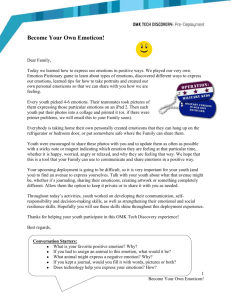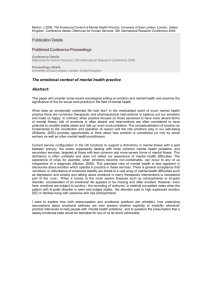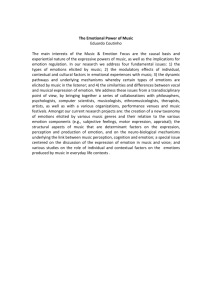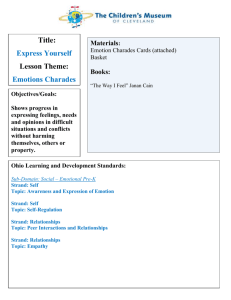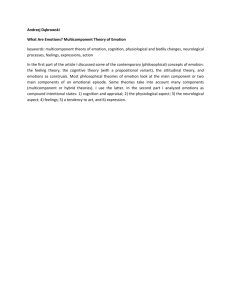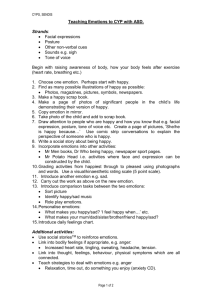direct_instruction_template2
advertisement
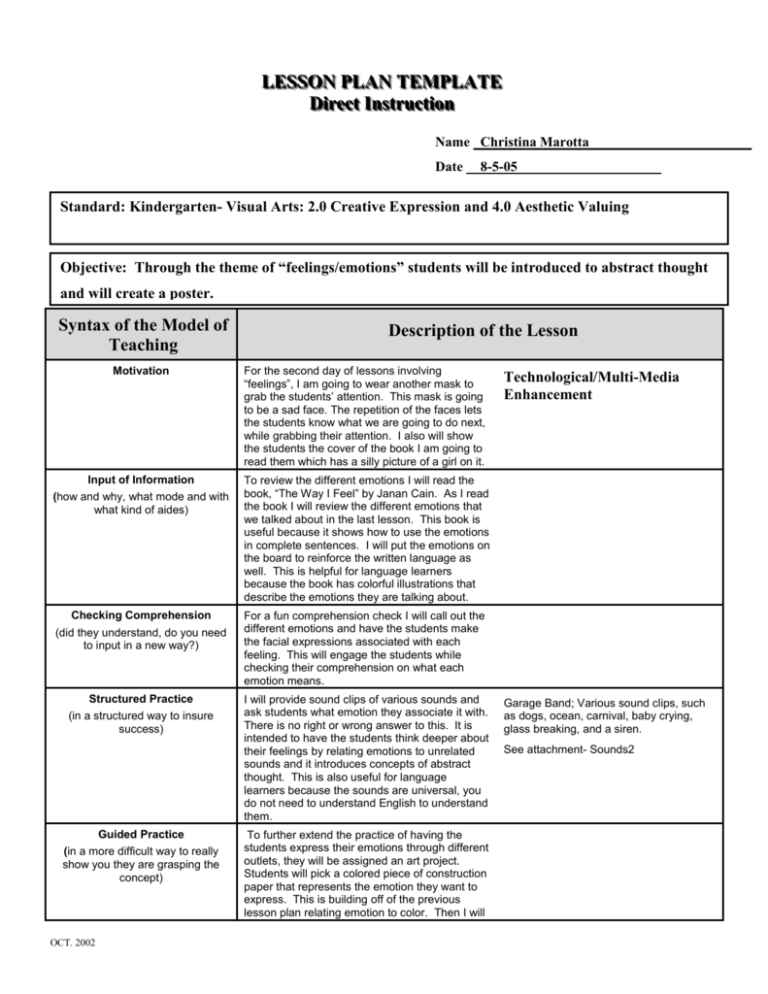
L LE ESSSSO ON N PPL LA AN NT TE EM MPPL LA AT TE E D Diirreecctt IInnssttrruuccttiioonn Name Christina Marotta Date 8-5-05 Standard: Kindergarten- Visual Arts: 2.0 Creative Expression and 4.0 Aesthetic Valuing Objective: Through the theme of “feelings/emotions” students will be introduced to abstract thought and will create a poster. Syntax of the Model of Teaching Description of the Lesson Motivation For the second day of lessons involving “feelings”, I am going to wear another mask to grab the students’ attention. This mask is going to be a sad face. The repetition of the faces lets the students know what we are going to do next, while grabbing their attention. I also will show the students the cover of the book I am going to read them which has a silly picture of a girl on it. Input of Information (how and why, what mode and with what kind of aides) To review the different emotions I will read the book, “The Way I Feel” by Janan Cain. As I read the book I will review the different emotions that we talked about in the last lesson. This book is useful because it shows how to use the emotions in complete sentences. I will put the emotions on the board to reinforce the written language as well. This is helpful for language learners because the book has colorful illustrations that describe the emotions they are talking about. Checking Comprehension For a fun comprehension check I will call out the different emotions and have the students make the facial expressions associated with each feeling. This will engage the students while checking their comprehension on what each emotion means. (did they understand, do you need to input in a new way?) Structured Practice (in a structured way to insure success) Guided Practice (in a more difficult way to really show you they are grasping the concept) OCT. 2002 I will provide sound clips of various sounds and ask students what emotion they associate it with. There is no right or wrong answer to this. It is intended to have the students think deeper about their feelings by relating emotions to unrelated sounds and it introduces concepts of abstract thought. This is also useful for language learners because the sounds are universal, you do not need to understand English to understand them. To further extend the practice of having the students express their emotions through different outlets, they will be assigned an art project. Students will pick a colored piece of construction paper that represents the emotion they want to express. This is building off of the previous lesson plan relating emotion to color. Then I will Technological/Multi-Media Enhancement Garage Band; Various sound clips, such as dogs, ocean, carnival, baby crying, glass breaking, and a siren. See attachment- Sounds2 give the students magazines and scissors to cut out pictures of people or objects that represent the emotion that they are trying to express. The lesson is intended to improve the students’ fine motor skills and cognitive skills. Cutting out pictures of different objects that symbolize their emotion rather than objects that directly show the emotion involves a more critical thinking than simple concrete thought. Closure ( how do you bring to a close and sum up what learning was to take place) Assessment (how do know the student learned what you hoped to teach) The students will share their posters and the other students will try to guess by the pictures and the colored paper what emotion they were trying to express. Then the students will explain what they illustrated. I will remind the students that there are different emotions and different ways to express them, and it is fine to feel any way they want to. Observations during lesson, monitoring while the students are making the posters, the final poster. Independent Practice (reflection of degree some students reached the objective.) Provide students with a worksheet with the words “Happy” “Sad” “Angry” and “Scared”. First, they have to trace the words. Below the pictures will be various pictures that the students have to match the words to. This assignment reinforces relating the illustrations to emotion while introducing the written words which will be used in the next lesson. OCT. 2002



